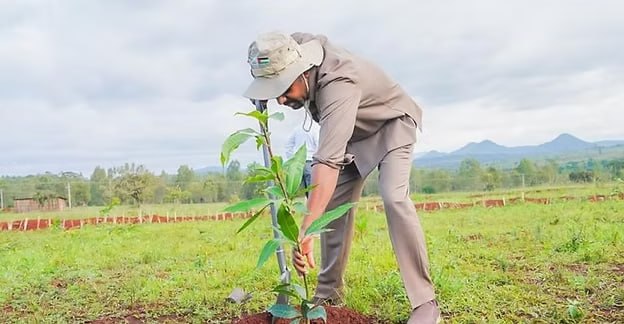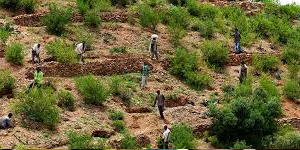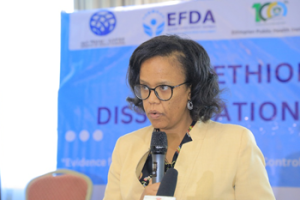
Ethiopia has been continuing its climate change mitigation efforts and strategies in 2024. As a result, the country made significant progress in the areas of Green Legacy Initiative, COP29, corridor development, Yelemat Tirufat are, and summer wheat production.
Ethiopia has experienced recurrent environmental problems that have impacted agriculture and livelihoods, such as soil erosion, the effects of climate change, and the loss of forest cover. Taking this fact into account, Ethiopian Prime Minister Dr. Abiy Ahmed started the Green Legacy Initiative, a massive afforestation and reforestation project, in 2019. The initiative has been continuing with the aim of improving biodiversity in the nation, restoring degraded lands, and fighting deforestation.
Accordingly, the country successfully planted 7.5 billion tree seedlings across the country in 2024. More importantly, on August 23, Ethiopia managed to plant more than 600 million tree saplings in a single nighttime event. This environmental protection work in general and initiative efforts in particular help Ethiopia’s forest cover toincrease from 17.2 percent in 2019 to 23.6 percent in 2024. Additionally, it has improved soil fertility, reduced erosion, absorbed carbon dioxide, and so on. In addition, it has boosted economic growth and reduced poverty in rural areas by generating jobs, particularly for women and young people.
Since reducing climate change impacts necessitates both regional and international cooperation, Ethiopia has urged the international community to support its green legacy initiative efforts and work with other African countries to join its tree-planting initiative.
In 2024, Ethiopia is also actively engaging and demonstrating its commitment to the United Nations Framework Convention on Climate Change (UNFCCC). The annual Conference of Parties (CoP) serves as a critical global venue for countries to negotiate and advance climate action, including debates on emissions reduction, adaptation methods, and climate-related project finance. As a result, Ethiopia’s climate change mitigation path is being presented to the world on COP every year. Similarly, COP29 was held in Baku, Azerbaijan, from November 11 to 22, 2024. Ethiopia not only participates but also demonstrates its global commitment.
The Ethiopian Ministry of Planning and Development Minister Fitsum Assefa (PhD) said that the COP29 conference demonstrated the value of collaboration and how collaboration efforts can strengthen a country’s position internationally. With the unwavering backing of its partners, Ethiopia was able to host a vibrant pavilion, lead important talks, and propose ambitious climate measures at COP29.
In addition to participation, Ethiopia has prepared climate change pavilions, which give an important chance for the country to highlight its numerous steps to address the impact of climate change and environmental disasters. The pavilion highlights Ethiopia’s efforts to develop climate-resilient infrastructure, sustainable land management methods, and renewable energy initiatives. Accordingly, the Pavilion demonstrated Ethiopia’s strong commitment to addressing climate change with realistic solutions and also encouraged the international community to support Ethiopia’s green legacy efforts, such as the irrigated summer wheat program and climate-smart urban development, she added.
Another significant effort implemented in 2024 is Yelemat Tirufat, also known as the Bounty of Basket. The initiative is a national program that aims to increase the production and productivity of dairy, poultry, eggs, honey, fish, and meat. It also intensifies efforts to ensure nutritional opulence and food self-sufficiency at the national and family levels.
According to Ethiopia’s Ministry of Agriculture State Minister Fikru Regassa, the Initiative’s implementation in 2024 is not only meeting but exceeding its expectations, with results coming ahead of schedule this year. This success considerably alleviates community issues by increasing agricultural yield and stabilizing market circumstances.
He also stated that the four-year initiative, which began two years ago, had already exceeded some major output targets. Milk output increased from 5.8 billion liters in 2021/22 to 10 billion liters last year, with expectations for 12 billion liters by the end of 2024/25. This year, the project intends to produce 12 billion eggs, up from 5.7 billion last year and 3.2 billion two years ago.
As stated byFikru, tremendous progress has been made in genetic enhancement through artificial insemination. “2.4 million cows were inseminated with enhanced breeds last year.” While local cows produce an average of 1.5 liters of milk per day, improved types produce an amazing 15 liters per day, emphasizing the importance of intervention. Although artificial insemination has been conducted in the country for 70 years, the program has revived the effort, resulting in 3.5 million inseminations in 2020, with 3.6 million expected this year.
When the Yelemat Tirufat (the Bounty of Basket) initiative was initiated, it was only 500,000 cows were inseminated; this number surged to 1.2 million in the following year and reached 2.4 million last year.
To increase egg output, 80 million improved chick varieties were also delivered last year. Improved animal feed and fodder kinds have been made available as part of efforts to increase productivity, he added.
Ethiopia launched the Corridor Development Project in 2024. This project combines urbanization projects with environmental conservation and climate change mitigation initiatives. The project began in Addis Ababa intending to improve transportation infrastructure, increase connectivity, and stimulate economic growth along major corridors in the city. Besides, its goal is to develop lively and sustainable urban places and promote environmental protection which improvesresidents’ quality of life.
Ethiopian Prime Minister Abiy Ahmed (PhD) explained that the Addis Ababa corridor development project intends to produce a clean and convenient environment, with major benefits for many people. In addition to other benefits, the project has increased job opportunities, elevated living standards, and improved general environmental cleanliness.
The government extends the Corridor development project throughout the country by assessing and considering its advantages. Because the project improves Addis Ababa’s transportation infrastructure by building roads, bike lanes, pedestrian walkways, and bus rapid transit (BRT) systems along major thoroughfares. Enhancing accessibility, lowering traffic, and encouraging environmentally friendly forms of transportation are all achieved by improving transportation linkages.
The development and production of summer wheat is another significant 2024 endeavor. Ethiopia has been striving to boost its agricultural output, notably summer wheat, as part of its larger initiatives to improve farmer lives and ensure food security.
Despite environmental concerns and climate change challenges, Ethiopia’s summer wheat production is progressing well. The government has doubled the quantity of land used for summer wheat cultivation, with intentions to cultivate wheat on nearly 3 million hectares during the dry season. This represents a 130 percent increase over the previous year’s coverage.
The Ethiopian Ministry of Agriculture reported that Ethiopia has become the best self-sufficient country in Africa by covering its wheat demand within three years of the 10-year development plan. Currently, Ethiopia, with its enhanced production and productivity,can harvest 40 quintals of wheat per hectare in its summer wheat program. The normal yield in the previous main rainy season was 30 quintals per hectare.
As stated by the Ethiopian Ministry of Agriculture, Ethiopia has become a self-sufficient country, having met its wheat demand within three years of the 10-year development plan. The country’s summer wheat program can now harvest 40 quintals of wheat per hectare due to increased production and productivity.
Ethiopian Ministry of Agriculture Minister Girma Amente (PhD) noted that Ethiopia became Africa’s largest wheat producer in 2024. “Ethiopia as of 2024 become Africa’s largest wheat producer. In volume terms, I mean. This is in fact a natural status the country deserves due to its convenient agroecology. Previously, countries which used only irrigation produced more than us. For we use both irrigation and rain our production makes 6 million quintals, assuredly covering the entire domestic consumptions.”
Ethiopian summer wheat cultivation is taking place over three million hectares. “Ethiopia stopped importing wheat last year because it had become self-sufficient.” Summer wheat production has surpassed the major rainy season yield.”
He also stated that Ethiopia’s produce from the summer and winter harvests of 6 million hectares exceeds domestic demand and is exported. “We are now convinced that we can completely cover what we desire. In 2024, we intend to cultivate three million hectares, with 1.9 million of that total already covered. This is 1.7 million hectares more than 2023.”
In general, all Ethiopian leaders have been attempting to address climate change in different ways, regardless of their political preferences, ideological differences, and styles of government. They have been giving due attention to water and soil conservation as well as planting tree seedlings.
Taking these facts into consideration, the current government is not only keeping up these efforts, but also widening the prevention of climate change through initiatives that are intended to save foreign currency, protect the environment, promote indigenous knowledge, ensure food security, beautify the city, and be used for food. In 2024, the Green Legacy Initiative, COP 29 Corridor Development, Summer Wheat Development, and Yelemat Tirufat (the Bounty of Basket) initiatives have all amply illustrated the efforts of the country. Therefore, it would be wise to step up these efforts in 2025.
BY EPHREM ANDARGACHEW
THE ETHIOPIAN HERALD WEDNESDAY 1 JANUARY 2025





